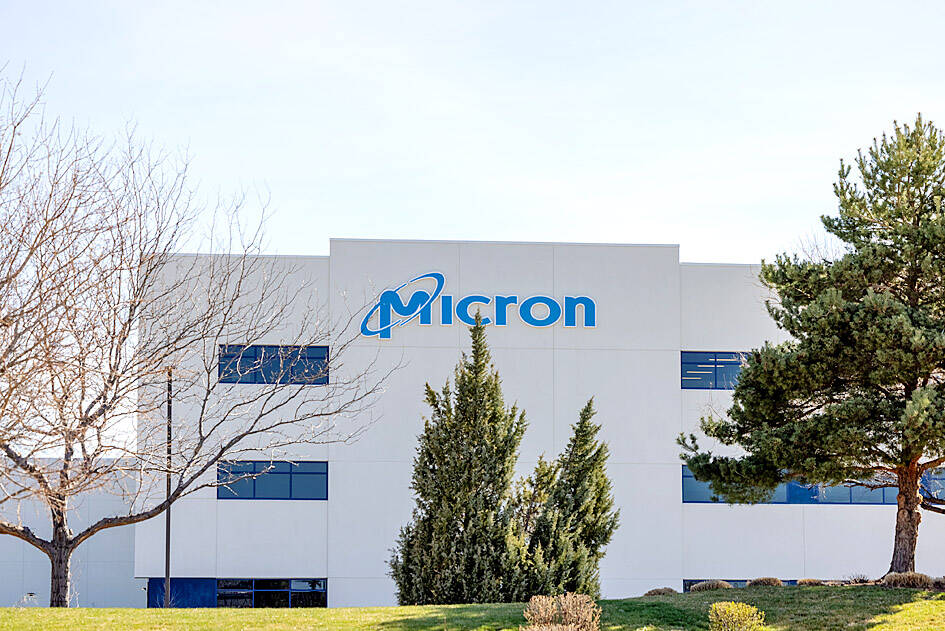Micron Technology Inc on Tuesday announced it would open a semiconductor plant in upstate New York, promising a long-term investment of up to US$100 billion and a plant that could bring 50,000 jobs to the state.
The company was lured to the Syracuse area with help from a generous set of federal, state and local incentives, including up to US$5.5 billion in state tax credits over 20 years.
The announcement comes after US Senate Majority Leader Charles Schumer had pushed for Idaho-based Micron and the company’s CEO, Sanjay Mehrotra, to consider upstate New York for its factory. It also comes months after Congress passed the US$280 billion Creating Helpful Incentives to Produce Semiconductors and Science Act, which set aside US$52 billion to bolster the semiconductor industry.

Photo: Bloomberg
“An investment of this scale in the US is simply not possible without significant government and community support,” Mehrotra said at the announcement.
In addition to tax credits tied to investment and job creation, New York has pledged US$200 million for road and infrastructure improvements where the plant is being built in suburban Clay and US$100 million to a “community benefit” fund. The state would also review supplying the operation with low-cost power.
The federal bill was aimed at bolstering US competitiveness against China and avoiding another chip shortage like the one that derailed the automobile and technology industries during the COVID-19 pandemic.
“Chips are essential to our economy, and if we were to lose the ability to manufacture chips here in the United States, it would be a severe, both economic security and national security risk,” Schumer said in an interview with The Associated Press. “This will be the most advanced memorychip manufacturing facility in the United States and probably the world. And it’s located in a place that will really benefit from it.”
The company plans to invest up to US$100 billion over the next 20-plus years to construct the project, with the first investment of US$20 billion planned by the end of the decade. The deal is also expected to bring more than 9,000 jobs to Micron, and officials believe it could also bring close to 40,000 other ancillary jobs to the region, from suppliers to contractors, officials said.
Micron has several chip manufacturing plants around the world, including in Singapore and Taiwan. The company announced last month that it would invest US$15 billion through the end of the decade on a new semiconductor plant in its hometown, which the chipmaker said would create 17,000 US jobs.
Manish Bhatia, Micron’s executive vice president of global operations, said that New York was selected in large part because it has a history of semiconductor development.
New York is home to 76 semiconductor companies, Schumer said.
“There is an ecosystem of other manufacturers, research institutions,” Bhatia said. “We believe we can funnel a lot of that talent” to the Syracuse area, including military veterans.

SEMICONDUCTORS: The German laser and plasma generator company will expand its local services as its specialized offerings support Taiwan’s semiconductor industries Trumpf SE + Co KG, a global leader in supplying laser technology and plasma generators used in chip production, is expanding its investments in Taiwan in an effort to deeply integrate into the global semiconductor supply chain in the pursuit of growth. The company, headquartered in Ditzingen, Germany, has invested significantly in a newly inaugurated regional technical center for plasma generators in Taoyuan, its latest expansion in Taiwan after being engaged in various industries for more than 25 years. The center, the first of its kind Trumpf built outside Germany, aims to serve customers from Taiwan, Japan, Southeast Asia and South Korea,

POWERING UP: PSUs for AI servers made up about 50% of Delta’s total server PSU revenue during the first three quarters of last year, the company said Power supply and electronic components maker Delta Electronics Inc (台達電) reported record-high revenue of NT$161.61 billion (US$5.11 billion) for last quarter and said it remains positive about this quarter. Last quarter’s figure was up 7.6 percent from the previous quarter and 41.51 percent higher than a year earlier, and largely in line with Yuanta Securities Investment Consulting Co’s (元大投顧) forecast of NT$160 billion. Delta’s annual revenue last year rose 31.76 percent year-on-year to NT$554.89 billion, also a record high for the company. Its strong performance reflected continued demand for high-performance power solutions and advanced liquid-cooling products used in artificial intelligence (AI) data centers,

Gasoline and diesel prices at domestic fuel stations are to fall NT$0.2 per liter this week, down for a second consecutive week, CPC Corp, Taiwan (台灣中油) and Formosa Petrochemical Corp (台塑石化) announced yesterday. Effective today, gasoline prices at CPC and Formosa stations are to drop to NT$26.4, NT$27.9 and NT$29.9 per liter for 92, 95 and 98-octane unleaded gasoline respectively, the companies said in separate statements. The price of premium diesel is to fall to NT$24.8 per liter at CPC stations and NT$24.6 at Formosa pumps, they said. The price adjustments came even as international crude oil prices rose last week, as traders

SIZE MATTERS: TSMC started phasing out 8-inch wafer production last year, while Samsung is more aggressively retiring 8-inch capacity, TrendForce said Chipmakers are expected to raise prices of 8-inch wafers by up to 20 percent this year on concern over supply constraints as major contract chipmakers Taiwan Semiconductor Manufacturing Co (TSMC, 台積電) and Samsung Electronics Co gradually retire less advanced wafer capacity, TrendForce Corp (集邦科技) said yesterday. It is the first significant across-the-board price hike since a global semiconductor correction in 2023, the Taipei-based market researcher said in a report. Global 8-inch wafer capacity slid 0.3 percent year-on-year last year, although 8-inch wafer prices still hovered at relatively stable levels throughout the year, TrendForce said. The downward trend is expected to continue this year,